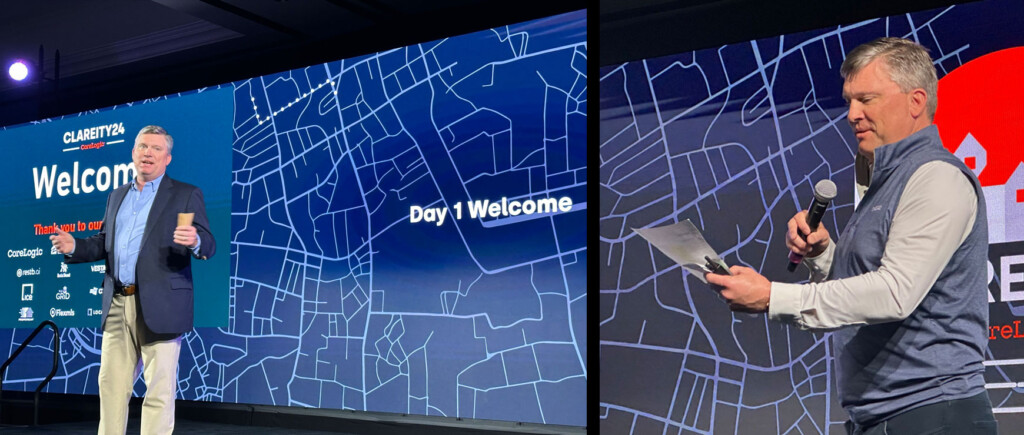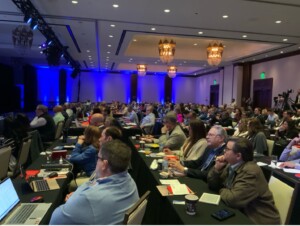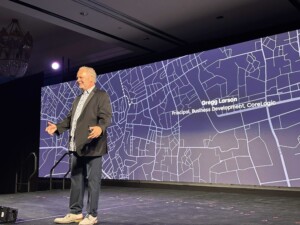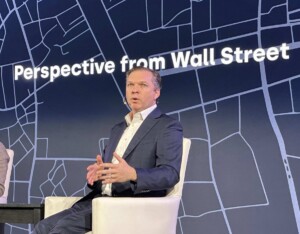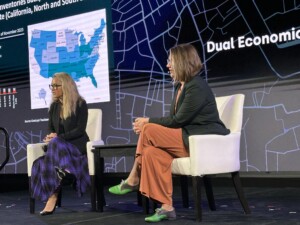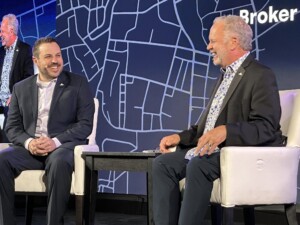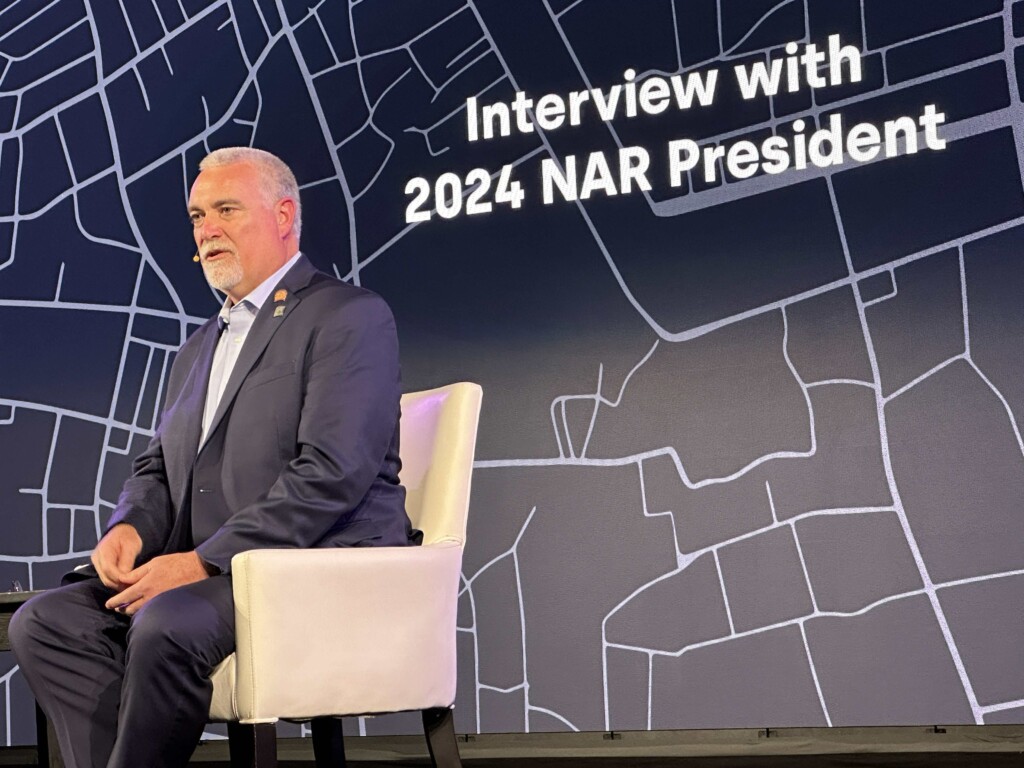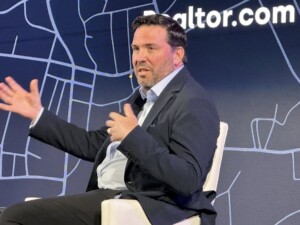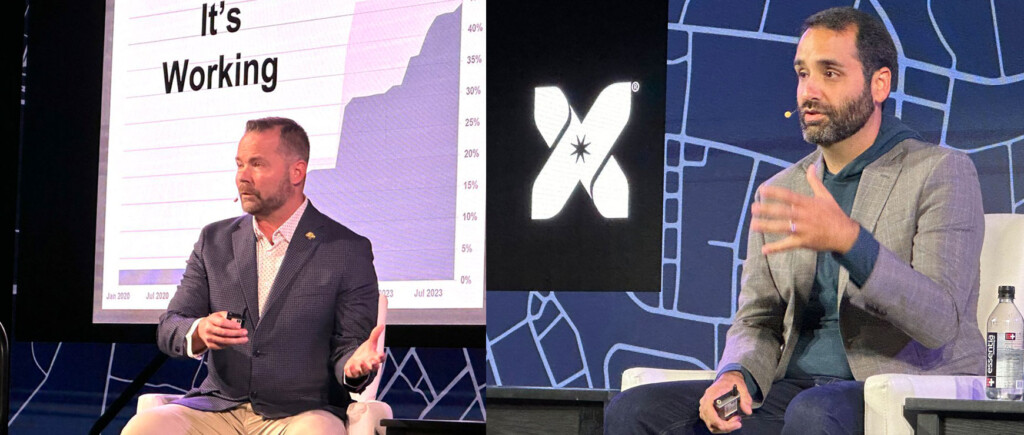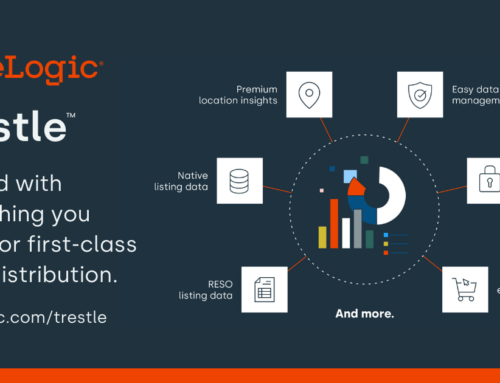With a new venue, fresh, cutting-edge content, a stellar lineup of industry experts, thought leaders, and legends – plus a sellout crowd featuring the Who’s Who of the MLS world – all the right ingredients were in place to make this year’s CoreLogic Clareity24 a best-yet event.
And it delivered that – and much more.
Clareity24 marked the inaugural event for Kevin Greene, the newly announced leader of CoreLogic’s Real Estate Solutions group, as its new Executive, General Manager. Kevin’s been a mainstay at Clareity conferences since its early days, both at CoreLogic and, before that, Real Estate Digital.
Taking the helm as the anchor MC of the event, Greene connected the key sessions throughout the conference, keeping the crowd engaged.
Gregg Larson and Matt Cohen, the founders of Clareity, which CoreLogic acquired seven years ago, remain highly involved in the MLS workshop they created over 20 years ago as hosts and moderators.
As he has for many years, Gregg opened the conference with his “hottest tech” talk, showcasing much of the coolest razor-edge tech from the recent Consumer Electronics Show in Vegas. Throughout, he discussed and showed photos of advanced technologies, including a robotic dog, lawnmower, and hospital robot, emphasizing their potential importance in our daily future lives. He later talked about the future of real estate, highlighting trends and technologies transforming the industry, including AI, cybersecurity, and affordable housing.
Finally, Gregg addressed the growing concern of AI-generated deep fakes and the need for AI to combat AI, as seen in the development of a standard for photo identification by camera makers Sony, Nikon, and Canon.
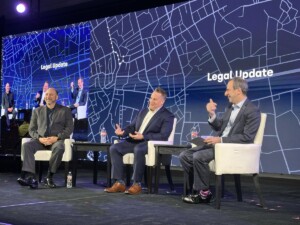
Attorneys Ed Zorn, VP & General Counsel, California Regional MLS; Mitch Skinner, Managing Member, Larson Skinner PLLC, and Claude Szyfer, Partner, Hogan Lovells LLP
Legal eagles take the stage
No single issue may be engaging the attention of real estate industry execs more than the plethora of class action and antitrust lawsuits – now more than 20 – and growing.
Top attorneys Ed Zorn, VP & General Counsel, California Regional MLS, Mitch Skinner, Managing Member, Larson Skinner PLLC, and Claude Szyfer, Partner, Hogan Lovells LLP, took the stage to discuss their take on the headline-grabbers in a highly transparent (and often blunt) way.
Discussing the temperature of the courts and the DOJ’s current stance, they conveyed that the offer of compensation as it exists today is unlikely to survive this antitrust concern. Collectively, they recommended that Associations and MLSs must focus on Buyer Agency Agreements and explore requesting buyer compensation as a seller concession. They pointed out the importance of agreements with clear terms and enforcement, which could help assuage DOJ concerns on transparency and consumer protection. What’s vital, they shared, is the importance of transparency and communication in real estate transactions, specifically to address the concern of steering.
They explained that plaintiffs are seeking to consolidate multiple real estate class actions in a single MDL (multidistrict litigation) proceeding with one judge. They discussed the potential implications of these legal challenges, including increased costs for home sellers and the impact on the overall market.
It was noted that the NAR has a chance of winning the “notwithstanding the verdict” motion, citing effective argumentation on the indirect purchaser role. They discussed the DOJ’s position that allowing sellers and selling brokers to negotiate commission rates will increase competition on the buy side and reduce commission levels overall. They noted that the DOJ is concerned that sellers and selling brokers will still be incentivized to offer high commission rates despite the rule changes. They also discussed a potential settlement with the DOJ and plaintiffs to end lawsuits and the DOJ’s stance on MLS data transparency.
5 key takeaways:
- Today, there are 20+ copycat commission lawsuits and over 140 defendants from all over the US, and more MLS Associations and Brokerages are being named in these growing suits.
- Defendants filed a motion for summary judgment in December; plaintiffs filed a cross-motion in response.
- Discussed the impact on home buyer representative services, especially for first-time buyers.
- Discussed recent settlements and verdicts in the real estate antitrust cases, with the potential for one defendant to be liable for the entire amount.
- Shared that they believe the per se rule should apply and noted that NAR and Home Services filed motions for judgment as a matter of law and a new trial, citing potential errors in the trial and the impact of the plaintiff’s counsel’s comments on the jury.
Quote of the session:
“The (MLS) system we have has been fantastic. For consumers, they have gotten more information about properties than any other country in the world by far.”
-Ed Zorn, CRMLS attorney
Wall Street talks Main Street
CoreLogic’s Devi Mateti, President, Enterprise Digital Solutions, led a discussion with Wall Street analysts Soham Bhonsle, Housing Services Analyst, VP, BTIG, and Chris Gough, Managing Director, Houlihan Lokey, about the interplay between public and private markets in the housing ecosystem.
They highlighted the impact of investor views on public companies like Redfin, Zillow, and Realtor.com and the role of small and midsize private companies in shaping the ecosystem.
Soham and Chris also discussed the impact of legal challenges, the interest rate environment, and market disruptions on public and private real estate companies. They highlighted the decline in growth capital investment and discussed the potential impact of lower commissions on public brokers.
Finally, the group also provided insights into the opportunity for consolidation and the rise of centralized platforms. They also emphasized the importance of Wall Street’s need to better understand the nuances of the real estate industry.
5 key takeaways:
- The decline in growth capital for private tech ecosystems, particularly in the residential Proptech sector, is due to macro factors such as interest rate environment and legal challenges.
- Questioned the resilience of public real estate brokerages, given their recent stock performance, and offered that some models might be stronger than others in the current uncertain environment.
- Noted Compass as their only brokerage with a buy rating, citing its productive agents and potential for luxury insulation.
- Noted private companies in the real estate industry may see consolidation and pressure to centralize around platform plays, challenging smaller agents and point solution businesses.
- Investors are prioritizing support for existing investments over new deals, as seen in the decrease in private capital rounds and increase in M&A activity.
Quote of the session:
Cream of the crop agents and teams rise to the top and utilize technology and tools around centralized platforms vs. single-point solutions. Centralized platforms are becoming “their operating system of record.”
-Chris Gough, Houlihan Lokey
Dual Economists share their updates
Two of the nation’s top housing economists, Selma Hepp, Chief Economist at CoreLogic, and Skylar Olsen, Chief Economist at Zillow, gave a deep dive into the US housing market — complete with dozens of charts — analyzing the current state of the market, focusing on supply and demand dynamics, trends, and affordability challenges.
They were mostly of the same mind about today’s critical economic issues, including the resilience of home prices despite mortgage rate increases.
5 key takeaways:
- Low mortgage rate holders are benefiting from a “financial advantage of a lifetime” and holding onto their homes longer, creating lower supply; coupled with high demand in the housing market, home prices continue to remain resilient despite interest rate increases.
- Noted the impact of mortgage rate changes on home prices, highlighting how price cuts have become more common in recent years due to increased demand and rising mortgage rates.
- Pointed out that home prices have flattened in recent months, like last year’s trend, and suggested that another surge in mortgage rates could lead to further price adjustments.
- It was also explained that price appreciation in recent years is largely due to people moving from higher-cost areas to lower-cost areas, driving up home prices with their increased cash and equity from their previous homes.
- New big worry: Insurance premiums have increased by 30% since the pandemic, with Florida experiencing the largest increase of 35%.
Cybersecurity experts weigh-in
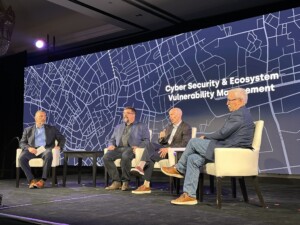
CoreLogic’s David Hamilton, CTO, Real Estate Solutions, moderator with Optiv execs James Turgal, VP, Cyber Risk and Board Relations, Bill Young, Managing Partner, Threat & Application Security, and Dave Hicks, Managing Partner, Identity
An all-star group of cybersecurity experts from data security leader Optiv – including a former leader at the FBI’s cybersecurity efforts – talked about the expected impact on the real estate industry and the growing threat of ransomware and other breaches.
CoreLogic’s David Hamilton, CTO, Real Estate Solutions, moderated a panel that included Optiv execs James Turgal, VP, Cyber Risk and Board Relations, Bill Young, Managing Partner, Threat & Application Security, and Dave Hicks, Managing Partner, Identity.
The panelists noted that community building, supply chain management, and employee education are crucial for managing cybersecurity risks in the real estate industry. They emphasized the importance of understanding the human element and reducing risk through practical measures.
They emphasized the frequency of cybersecurity breaches – 75 in the real estate industry last year alone, costing $50 million and growing – and warned they expect more is coming and the industry needs to be prepared. Finally, they discussed the massively arduous process of obtaining cybersecurity insurance, including cost, upfront investment, HR involvement, and manual verification by insurance carriers.
5 key takeaways:
- Discussed common security threats in the real estate industry, highlighting widespread security incidents, including ransomware and weak passwords, and the need for multi-factor authentication (MFA) to reduce the ways bad actors gain access to MLS systems.
- Stressed the importance of understanding and reporting threat vectors and their impact on business operations, highlighting the need for board members to ask the right questions of their cyber staff to identify vulnerabilities and close them as the estimated cost of covering the average breach is $4.35 million, which can be a significant burden for smaller organizations to self-insure.
- Explained the importance of end-user education and security awareness as they are often the weakest link in the system, the need for developer training and secure coding practices, and the value of making a significant financial investment to protect versus the more expensive cost of responding.
- Reviewed the importance of understanding cyber threats in a social media-driven world and how social media provides all the necessary personal info for software breaches, especially with AI advancements enabling cybercriminals to create more sophisticated breaches, making them harder to detect and stop.
Quote of the session:
“Protect everything, you protect nothing” – James Turgal
Contracting for Security 101
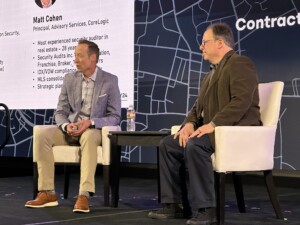
CoreLogic’s Rob Tennant, Chief Information Security Officer, and Clareity cofounder Matt Cohen, now Principal, Advisory Services, CoreLogic
Clareity cofounder Matt Cohen, now Principal, Advisory Services, CoreLogic, and Rob Tennant, Chief Information Security Officer, CoreLogic peeled back the onion to carefully review the steps needed for MLSs to understand the legal requirements for information security contracts in the real estate industry.
They shared their experiences and insights on managing data security, including identifying and addressing data storage and transmission vulnerabilities. They emphasized the potential consequences of failing to manage data security effectively, including legal liability and financial losses. They also discussed the importance of including security requirements in contracts, separating security provisions from the master service agreement, and understanding breach terms.
5 key takeaways:
- Establish boilerplate contract language to streamline future agreements and meet security requirements.
- Include specific security requirements in a separate document rather than in the master service agreement to avoid overwhelming the contract with unnecessary details.
- Contracts should include provisions for the right to audit security measures, with options for annual or post-breach reviews.
- Test your disaster recovery plan during a security event to ensure success. If you experience a data breach and shut down your system, where is your recovery plan? In the shut-down system? Can you reach your executive board and legal team to make decisions quickly in case of a breach?
- Understand what constitutes a breach in a contract, particularly in the context of data security.
Recalibrating the NAR/MLS relationship
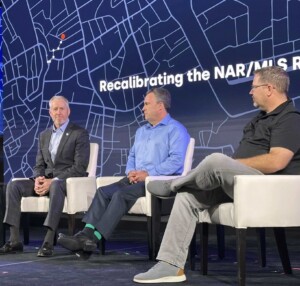
Brian Donnellan, President & CEO, Bright MLS; Art Carter, CEO, CRMLS, and Tim Dain, CEO, NorthstarMLS
The head of the Council of MLS, Denee Evans, moderated a panel of MLS top leadership, including Art Carter, CEO, CRMLS; Brian Donnellan, President & CEO, Bright MLS; and Tim Dain, CEO, NorthstarMLS, collectively representing nearly a quarter of a million Realtors®.
Their discussion focused on the future of MLS and its relationship with NAR, as well as potential changes in MLS ownership and governance. The panel reviewed the importance of scenario planning for possible changes in the MLS industry, including settlements and court cases. They highlighted the need for more collaboration and eliminating obstacles to improve the industry.
Tim talked about exploring a new ownership structure as an MLS, discussing research on future ownership structure with shareholders, including ESOP and Realtor Association ownership, saying, “The problem isn’t with ownership, it’s with governance.”
They discussed the importance of consumer-focused policies in MLSs, citing the need for uniform rules and standards across the country. They also raised concerns about mandatory rules changing in response to lawsuits and the potential for confusion without clear guidelines.
5 key takeaways:
- The panel discussed removing ties between MLS ownership and Realtor membership to speed up decision-making.
- They noted that an MLS’s historical value is primarily derived from membership value, leading to a focus on delivering great service rather than profit.
- They talked about the need to recalibrate the relationship between NAR and MLS to adapt to changing technology and landscape, with potential changes occurring over the next 12 months.
- They emphasized the importance of communication and transparency between NAR and MLSs, citing the need for a more proactive approach to address the changing industry landscape.
- They point to the lack of communication and transparency from NAR, which is causing difficulties for MLSs and their membership and could lead to negative consequences if not addressed in the short term.
Quotes of the session:
It’s “probably time for NAR to sever the relationship between Realtor membership and MLS participation.”
– Tim Dain
“You can create as many corporate companies as you want, but if you stick the same board in there and you’re expecting a different outcome…”
– Brian Donnellan
AI in the spotlight
One of the top female AI leaders, Dr. Radhika Dirks, CEO and cofounder of Xlabs and RIBO AI, gave a level-setting keynote address on artificial intelligence. She reviewed how AI has begun to revolutionize a variety of industries and acknowledged that ethical considerations and practical adaptations are crucial to navigating an AI-driven world.
She discussed the potential of generative AI in customer care while acknowledging its limitations and risks. In real estate, she noted that AI tools are being rapidly adopted and have the potential to transform our industry.
She noted AI has already surpassed human capabilities in many areas and advocated a need for humans to “recalibrate” and find their unique value in a world where AI is rapidly advancing.
Her key takeaway was despite all the concerns about AI, she encouraged attendees to embrace AI’s transformative power.
Five GOATs steal the stage
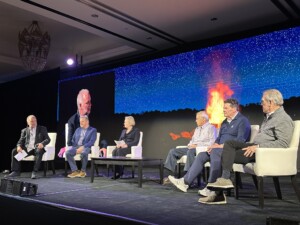
David Charron, Former President and CEO of Bright MLS; John Mosey, Former President and CEO of NorthstarMLS; Bud Fogel, Former CEO at MRED; Yvette Acuff, former CEO of MLS of Hilton Head Island; and Carl DeMusz, Former CEO of MLS Now
When Gregg Larson walked on stage with David Charron, Former President and CEO of Bright MLS; John Mosey, Former President and CEO of NorthstarMLS; Bud Fogel, Former CEO at MRED; Yvette Acuff, former CEO of MLS of Hilton Head Island; and Carl DeMusz, Former CEO of MLS Now, the audience was about to witness nearly 300 years of collective MLS wisdom and experience in action.
The Greatest Of All Time did not disappoint. The conversations explored decades of changes, challenges, and opportunities in the real estate industry. These legends shared the importance of integrity, respect, and trust.
They also told tales that had the audience erupting in such unrestrained laughter that the very walls of the conference center seemed to tremble with joy.
It was the most fitting way to end Clareity24, with legends who profoundly impacted our industry over five decades of change in the real estate industry.
MLS Latest Innovations
A long tradition at Clareity MLS Workshops has been showcasing the major MLS technology partners on stage to provide an overview of their organization and their most recent developments to serve the MLS industry better.
It was a first-class group of MLS tech leaders on stage including Kevin Hughes, SVP of Sales and Business Development, Black Knight/ICE; Matty Epstein, Director of MLS Sales, FBS; Kevin Greene, General Manager, CoreLogic Real Estate Solutions; Scott Quinn, VP, Sales, Rapattoni Corporation; Carlos Grass, CEO, Stratus Data Systems, and Kelly (Pantis) Robinson, VP, Sales and Marketing, VestaPlus.
The presenters discussed integrating modern MLS platforms, data-driven approaches, and advanced technologies to enhance the real estate user experience. They emphasized the importance of seamless workflows, user interfaces, and data infrastructure and leveraging data to complement MLS systems and improve subscriber services.
BPP’s Dan Troup, NAR’s Kevin Sears, Realtor.com, Zillow, RESO and other Clariety24 highlights
In addition to assembling the GOAT appearance, perhaps CoreLogic Clareity24’s most impressive accomplishment was the breadth and depth of quality content it covered in a day and a half.
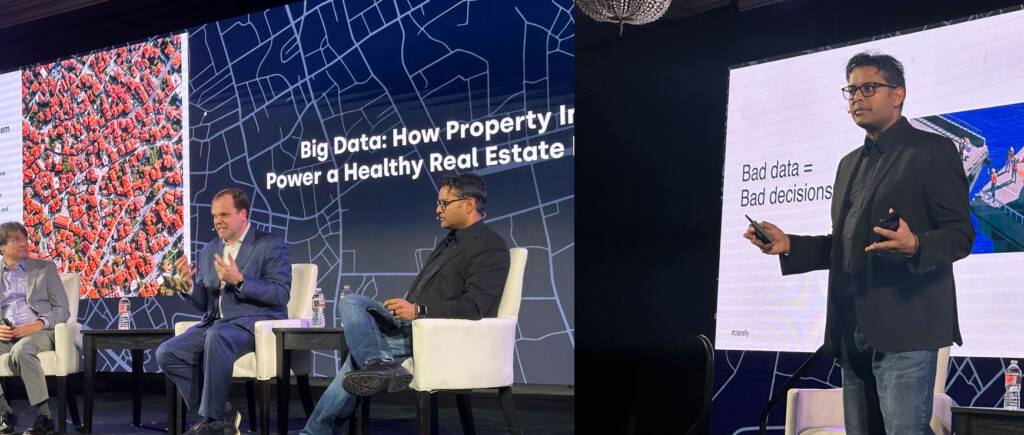
CoreLogic’s Shaleen Khatod, Executive, GM Product Strategy and Innovation leader; Leonard Kiefer, Deputy Chief Economist at Freddie Mac, and Michael Toner, SVP, Digital Sales & Real Estate Center, Bank of America
The conference also was packed with significant contributions by other industry leaders. CoreLogic’s Shaleen Khatod, Executive, GM Product Strategy and Innovation leader, was joined on stage by leaders from two of the biggest players in housing finance: Leonard Kiefer, Deputy Chief Economist at Freddie Mac, and Michael Toner, SVP, Digital Sales & Real Estate Center, Bank of America.
Their conversation centered around the crucial role of data in informing decisions in the financial industry, particularly in the real estate sector. The discussion focused on the challenges of working with disparate data sources and the importance of accurate and available data to drive growth.
The Scottsdale, Arizona gathering marked the stage debut of Dan Troup, former RE/MAX tech exec, who was introduced as the new head of the Broker Public Portal.
Another first: it was the first time a sitting president of the National Association of Realtors, Kevin Sears, would be featured on stage at a Clareity MLS Workshop. Kevin candidly discussed the challenges facing the industry with Gregg Larson, including NAR’s response to litigation, cultural transformation, and advocacy. Kevin also emphasized the importance of clearly articulating and communicating what Realtors do for clients to justify their compensation
Damien Eales, CEO of Move, Inc./Realtor.com, gave an update on his portal, noting Realtor.com’s dual commitment to empowering customers and serving the real estate industry. He discussed the importance of generating an engaged audience and the pros and cons of audience metrics.
Throughout his talk, he emphasized the importance of promoting professionalism and building trust with consumers through realtor.com, while balancing this objective with the obligation to promote the benefits of real estate professionals.
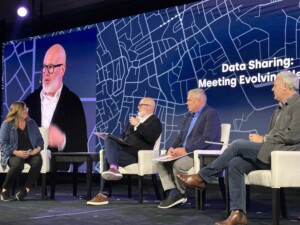
Nicole Jensen, realMLS, included Joseph Szurgyi, MLS Grid; Jason Romig, CoreLogic, and Turan Tekin, ShowingTime+
A Data Sharing session hosted by Nicole Jensen, realMLS, included Joseph Szurgyi, MLS Grid; Jason Romig, CoreLogic, and Turan Tekin, ShowingTime+, sharing the most crucial takeaway: aligned goals from the beginning.
Zillow’s Erroll Samuelson, also interviewed by Gregg Larson, discussed Zillow’s focus on its “super app.” He also talked about its listing lead model, advertising strategy, impact on the industry, and concerns on the commission issues today. He noted he is not a fan of Homes.com’s “My Listing My Lead” model and finds it problematic. He explained it can lead to dual agency and undermine the cooperative aspect of the MLS. Ironically, he added the Homes.com Super Bowl ads, which may be why Zillow saw a spike in traffic. Overall, Erroll emphasized embracing change and working together to address industry challenges.
RESO’s Sam DeBord and Chris Haran of MRED and RESO discussed how interoperability and standards are crucial in the real estate industry. Sam talked about the potential for technology language to transcend borders and geography as RESO now grows internationally and that MLSs need to prepare for the hard work ahead with the debut of RESO 2.0.
While 93% of MLSs are RESO certified and 45% have converted to the Web API, more implementation is still needed.
Other conference key moments included a review of what people in our industry are reading on the most recent trade news site entry, Real Estate News, by its President, Mitch Robinson. He emphasized the need for media outlets to prioritize journalism over clickbait headlines and provide valuable insights rather than sensationalized coverage.
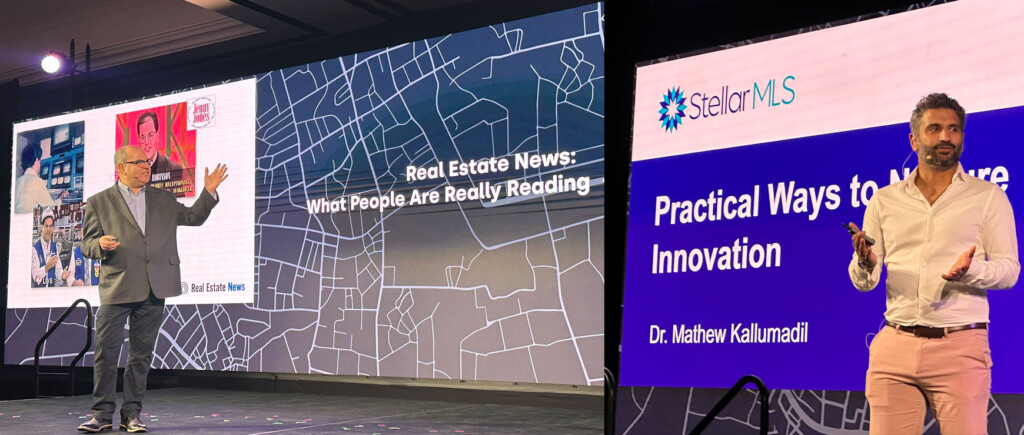
Real Estate News President, Mitch Robinson (left) and Stellar MLS’s Dr. Mathew Kallumadil, Vice President, Technology & Innovation
One final highlight: Dr. Mathew Kallumadil, Vice President, Technology & Innovation, Stellar MLS, engaged the audience in an active participation exercise during his talk on “Practical ways to nurture innovation. He shared experiences developing solutions to improve support teams’ efficiency and data quality, highlighting the value of AI-powered data analysis. Most importantly, he noted that small changes can create important innovation.
How will 2025 top this one?
The CoreLogic Clareity24 conference illustrated Dr. Kallumadil’s observation that small changes can lead to big innovations. Early conference survey results indicate that this year’s conference was once again one of the best yet, raising the bar for success.
To paraphrase Matt Cohen’s observation in a social post after the conference, each year, the Clareity MLS Workshop feels like the best one yet, pushing his firm to find a way to make the next one even better.
Suggestion for MLS execs: Mark February 17-19, once again, in Scottsdale, Arizona, on your calendar.
We’d love to hear your feedback if you attended this event.
